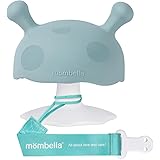Are you a new mom who has heard the classic advice, “Sleep when the baby sleeps,” only to find yourself nodding along with the mom in the video above, wondering how that’s even possible?
You’re not alone. While well-intentioned, this common piece of sleep advice for new moms often feels like a cruel joke to those navigating the raw, exhausting reality of caring for a newborn. Newborns have their own unpredictable schedules, and the moments they do drift off are often when you feel compelled to tackle chores, eat, or simply stare blankly at a wall.
Understanding the Reality of Newborn Sleep Patterns
The core challenge for new moms trying to get adequate rest stems from the unpredictable nature of newborn sleep. Unlike adults who typically sleep for long stretches, babies operate on much shorter cycles, often waking every 2-3 hours for feedings.
This fragmented sleep means that even when your baby does doze off, your own body struggles to enter deep, restorative sleep. It’s like trying to fill a bucket with a leaky faucet; you’re constantly topping it up but never quite getting full. This makes truly “sleeping when the baby sleeps” a feat only achievable under very specific, often unrealistic, circumstances.
Beyond the Cliché: Practical Sleep Strategies for New Mothers
Since the ideal scenario of synchronized sleep is often a myth, what practical sleep tips for new parents can actually make a difference? Instead of waiting for perfect alignment, new mothers need proactive strategies that prioritize rest whenever and however it can be found.
Consider implementing a “power nap” strategy. Even short 20-30 minute naps can significantly improve alertness and mood, especially when strung together throughout the day. Think of these brief rests as small energy boosts, much like quick charges for your phone, keeping you from completely running on empty.
Building Your Support System: The “Give the Baby to Me!” Approach
One of the most powerful and realistic pieces of new mother sleep advice comes from the supportive person in the video: “Give the Baby to me! You go and sleep, I will take care of the baby meanwhile.” This highlights the critical role of a robust support system.
Don’t be afraid to ask for help, whether it’s from a partner, family member, or trusted friend. Delegating baby care for a dedicated sleep block can be a lifesaver. This isn’t a sign of weakness; it’s a strategic move to preserve your physical and mental health, ensuring you can be the best parent possible.
Communicating Needs and Delegating Responsibilities
Open communication with your partner is vital for managing new moms sleep challenges. Establish clear shifts for night feedings or comforting the baby. For example, one partner might handle the first half of the night, while the other takes over for the second half.
This shared responsibility ensures that both parents get uninterrupted stretches of sleep, even if they aren’t long. Think of it like a relay race; you’re passing the baton of care, allowing the other person to rest and recover before their leg of the race.
Prioritizing Rest Over Chores
When the baby is finally asleep, your instinct might be to jump up and tackle the mountain of laundry or dirty dishes. However, for a new mom, sleep should often take precedence over household chores.
Resist the urge to be a superhero. Your energy reserves are precious, like a limited-edition resource. Spending that rare moment of peace on chores rather than rest can leave you feeling even more depleted. The dishes can wait; your rest cannot.
Creating a Sleep-Friendly Environment (Even for Naps)
Maximize your chances of falling asleep quickly during those precious windows. Keep your sleeping space dark, quiet, and cool, even during the day. Consider using blackout curtains, earplugs, or a white noise machine.
This preparation signals to your body that it’s time to rest, making it easier to drift off without the mental chatter that often accompanies postpartum self-care efforts. Treat these nap times with the same seriousness as you would nighttime sleep.
Addressing Common Hurdles to Sleep for New Moms
Many new moms face barriers to getting restorative sleep, even when presented with opportunities. One common issue is anxiety; the moment the baby falls asleep, your mind might race with “what ifs” or the next item on your to-do list.
Another hurdle is the biological drive to be “on call,” often heightened by breastfeeding hormones. Your body is wired to be alert to your baby’s needs, which can make deep sleep elusive. Acknowledge these feelings without judgment, and gently try to redirect your focus to rest.
Navigating Visitors and External Pressures
While a support system is crucial, sometimes visitors can inadvertently add to the pressure, especially if they expect entertaining or if you feel compelled to host. Don’t hesitate to set boundaries.
Inform well-meaning guests that you might need to excuse yourself for a nap, or suggest they come over specifically to help with the baby so you can rest. Your priority is your well-being and the care of your newborn, not playing hostess.
Seeking Professional Help for Persistent Sleep Issues
If you’re finding it impossible to get any restorative sleep, or if feelings of overwhelm and exhaustion are constant, it’s important to talk to your healthcare provider. Persistent sleep deprivation for new mothers can impact your mental health and overall well-being.
They can offer guidance, check for underlying issues, and connect you with resources that provide practical support and strategies tailored to your situation. Remember, seeking help is a sign of strength, not weakness, especially when dealing with the demanding journey of early motherhood and optimizing sleep for new moms.
Awakening to Answers: Your New Mom Sleep Q&A
Why is “sleep when the baby sleeps” often unhelpful advice?
This advice is often unrealistic because newborns have unpredictable, short sleep cycles, and new moms have other important tasks to do when the baby sleeps.
Why do newborns make it hard for new moms to get deep sleep?
Newborns sleep in very short cycles, often waking every 2-3 hours for feedings. This fragmented sleep makes it difficult for a new mom’s body to achieve deep, restorative rest.
What is a quick way new moms can boost their energy?
Try taking short 20-30 minute “power naps” whenever the opportunity arises. Even brief rests can significantly improve alertness and overall mood.
How important is it for new moms to ask for help with the baby?
It is very important to ask for help from a partner, family, or trusted friend. Delegating baby care allows new moms to get dedicated sleep blocks, which is crucial for their well-being.











